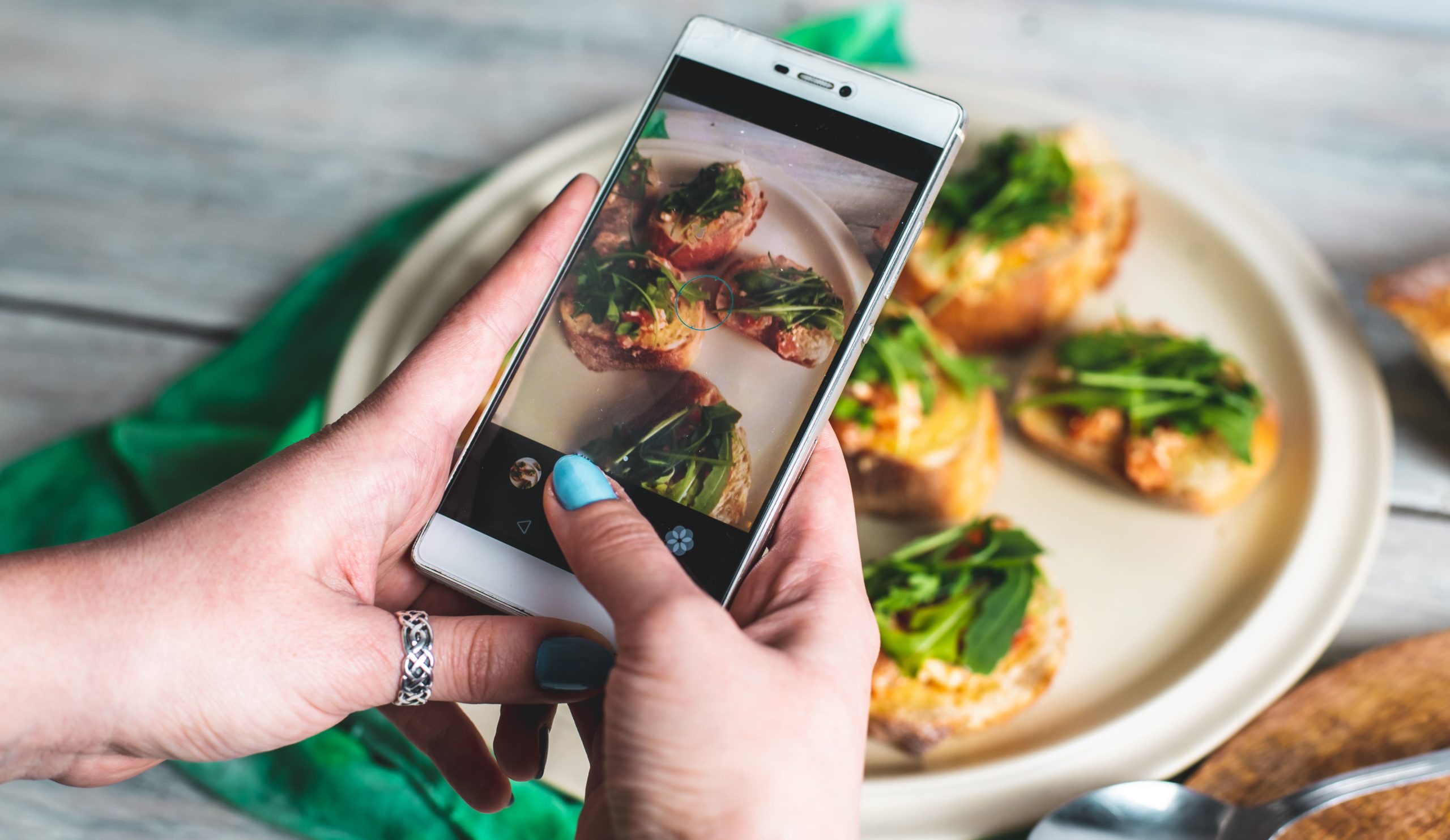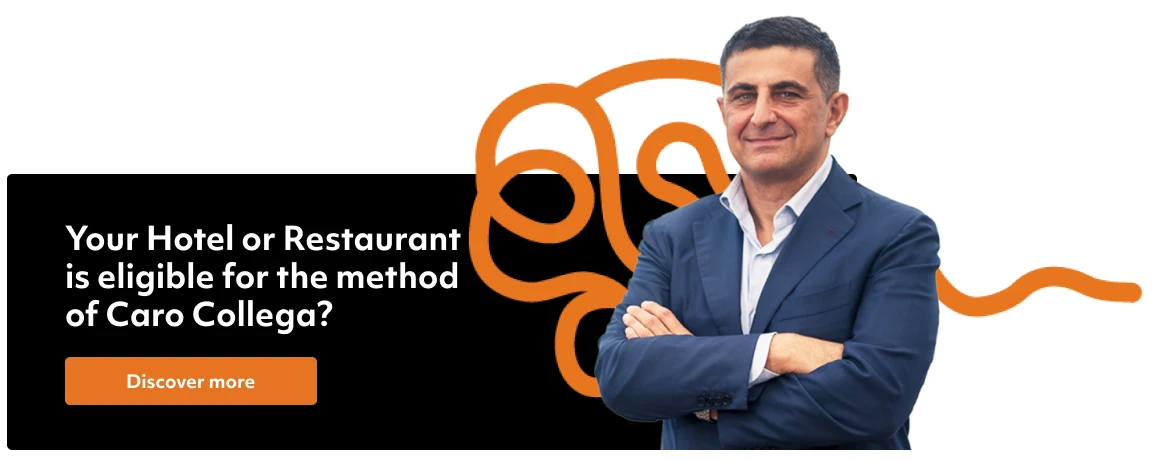You are a restaurateur or hotelier and you surely have the dream of filling all the tables and all the available rooms any day of the week.
In this article I explain how it is possible to achieve the goal dreamed of by all those who run a business in the hospitality sector by developing a Digital Marketing Plan for Restaurants and Hotels.
Accordingly, you will find answers to the following questions:
- What does it mean to do Digital Marketing for Restaurants and Hotels?
- Why is it important?
- What can it mean for your Restaurant or Hotel?
- Is it a sustainable investment if I rely on professionals?
I am Giancarlo De Leonardo, a former Restaurateur and Hotelier. Over the past 5 years I have co-founded an Innovative Startup and today I work to develop the business of Hotels and Restaurants through a Method I have called Dear Colleague, based on Digital Marketing.
In this article
From Traditional Marketing to Digital Marketing
The starting point is simple: every company in the world relies on its marketing department to find new business solutions and to make more money. Why not bring this concept to the hospitality industry as well? When I was a restaurateur and hotelier I used to complain about the daily difficulties I encountered but I never believed that marketing could help me. Instead, the solution was simple and now that I have metabolised it, I want to share it with you, Dear Colleague.
Let’s start with a fundamental distinction.
Over the last 25 years, the world has changed due to the Digital Revolution that has had a devastating impact on our lives. Just think of the iPhone, Social, Netflix, Uber, Spotify, Amazon and so on. Clearly the way we do marketing has also changed.
When I was a restaurateur, 20 years ago now, I used to promote my business directly with the tools that traditional marketing offered: leaflets, ads in the yellow pages, advertisements in newspapers and magazines, billboards, spots on the radio or local TV. Today, advertising a business in this way would represent real business suicide. At the same time, you cannot be paralysed like I was when I was a restaurateur and hotelier like you. In fact, even children know that advertising is the soul of commerce!
As we continue to be in the midst of the Digital Revolution, the obvious solution is called Digital Marketing. The goal is to reach potential customers where they spend the most time, i.e. on the Internet and social media. That is why we have to create a digital presence of our company, which means working on a high-performance website, local seo, social media, paid advertising campaigns (ads), storytelling and copywriting, web reputation, and corporate culture. Every day, ‘end of the day’ as Giulia Bezzi among the most authoritative SEO experts would say.
- Can you do it yourself? Certainly if you have time and passion (today you can find any explanation on the Internet);
- Can you find someone to do it for you? This is the solution I would choose today if I were a restaurateur or hotelier;
- Can you keep doing nothing?
Albert Einstein said that mad is he who continues to behave in the same way but expects different results. If you are reading this article, it means that you are trying to understand how to make more money and a Digital Marketing Plan for Restaurants and Hotels can be of great help to you.
To help you better understand I have written this article where I list the 8 key activities that I implement when we at Dear Colleague become a partner of a Restaurant or Hotel. At the end you will also find a bonus related to the unfailing requirement in all successful businesses I have encountered to date, I recommend not to miss it.
Following this path means having a compass that shows you the way to ferry a Restaurant or Hotel towards a new business model, in perfect harmony with the digital world in which we live.
Not an easy path that requires constancy and the commitment of at least 2 hours a day, which is the minimum amount of time that we at Caro Collega dedicate to developing the Integrated Digital Marketing Plan of our partners.
Another significant fact I want to share with you is that daily work pays off, i.e. it brings tangible and measurable results: the minimum objective we have achieved by applying the Caro Colleague Method was to multiply the investment made by 3 times. You got it right! For an investment of 100 you will invoice at least 300!
It is no coincidence that on our website we promise for Restaurants eligible for our path an increase of € 100,000 in 12 months, with a satisfied or reimbursed guarantee.
Let’s get started.

Fundamentals of a Digital Marketing Plan
1. Strategy: The starting point for structuring a Digital Marketing Plan for Restaurants and Hotels aimed at improving the performance of your business is strategy.
When I used to work in the hospitality industry, every time they talked to me about strategic analysis, I thought they were trying to ‘fleece’ me out of money. Now I know very well that it is a preventive activity of fundamental importance: only after studying the target market and contextualising the starting situation can you define the objectives and the tools necessary to achieve them. It is like when you go to the doctor: first he examines you and then he prescribes your medicine. So if you want to improve your company’s performance, be wary of anyone who sells you solutions before having studied your business, your competitors, your target audience and your needs in order to create a customised strategy that allows you to stand out from the crowd and achieve your goals. By the way, as the world changes at the speed of light, your strategy will also have to be adapted accordingly.
Tip: learn to think in a ‘win-win’ logic and focus your attention not on how to minimise your investment (good professionals cost the same as a quality restaurant or hotel as compared to a ‘normal’ one), but on choosing an agency that can guarantee a return on the minimum investment. Investing 30 K on marketing may seem like a lot, but what if the return in terms of directly attributable turnover was 100 K?
2. SEO & Local SEO: Once upon a time, I remember that there was a column in the puzzle week entitled: “maybe not everyone knows that…” where you would find trivia that would leave you speechless. I too was amazed when I realised the difference between the searches people do on Google Search and those they do on Google Maps.
SEO (an acronym for Search Engine Optimisation) is the set of daily activities necessary to position your website in the first 5/10 results of a search by users (if you position yourself further than this, it is as if you don’t position yourself at all because 90% of people are ‘satisfied’ with the first 10 results). Keep in mind that having a website updated a few years ago is tantamount to not having a website at all, whereas having a website updated according to the parameters introduced by Google in June 2021 (Core Web Vitals) means attracting potential customers and turning them into cash.
LOCAL SEO, on the other hand, includes the daily activities necessary to position your company’s physical address to become the preferred answer to enquiries from users who are geolocalised near you. It is no coincidence that 70 per cent of the queries users make on Google Maps have as their object the query ‘Restaurant near me’. Working on Local SEO therefore means becoming the answer that Google Maps offers its users when certain conditions occur (intention, proximity, relevance, etc.).
If I live in Rome and I am looking for a hotel for my next stay in Milan, I use Google Search by entering the word Milan in the search query (e.g. Boutique Hotel Milano), but if I am in Milan and I need a restaurant near my location I use Google Maps because I want the search to show me restaurants near me.
Working on SEO and LOCAL SEO means intercepting potential customers and consequently developing turnover. Why let your competitors ‘put the arrow in and leave you at the post’?
3. Graphic & Web Design: ‘There is never a second chance to make a good first impression’.
Too many times I come across entrepreneurs and managers in the hospitality industry who think in the traditional way, as I did. They think they have few resources at their disposal to do marketing and settle for unprofessional support. But now you know that doing marketing means tripling the investment made. And many of the activities carried out also require a professional Graphic Designer and Web Designer. Why?
Having a graphic designer prepare a professional invitation or playbill for you, or layout a menu or wine list, or design a logo, helps your company position itself at the level it deserves. Do you know how many entrepreneurs and managers of 5-star restaurants or hotels present menus and brochures that are not up to their standards? This seems like a good opportunity to gain a competitive advantage, or am I wrong?
A similar argument must be made for the work done by web designers who take care of the website or landing pages, perhaps changing the photos on the site or inserting pop-ups to promote events and tasting evenings.
I don’t want to go on too long, but I hope I have succeeded in making you understand that “if your ambition is to develop a Digital Marketing Plan for Restaurants and Hotels you need a heterogeneous Team capable of facing the challenges of an increasingly global and competitive market.
4. Social media: Social media such as Facebook, Instagram, Pinterest, Whatsapp, TikTok, YouTube, Messenger, TikTok, Telegram, Google Messaging App, are fundamental to the success of a Digital Marketing Plan for Restaurants and Hotels as they are an inexhaustible source of customer acquisition.
But there is one condition: they require an effort that cannot be delegated, as in the case of @nusr_et who is engaged in content creation on a daily basis.
I’ll give you a piece of bad news: if you aspire to become the new Nusr_et and acquire millions of followers organically, it is almost impossible to succeed unless you have a million-dollar budget to invest (but would that make sense?).
On social media your company must have a presence and show an image consistent with the company’s reality. Usually your potential customers can find you on Google Maps or Search and then look for confirmation of their first impression on social; vice versa they can find you on social and then look for feedback on your website or on the company profile you have on Google.
Keep in mind that social media was created with the aim of socializing people. For this reason, structuring your business strategy will be more effective if you or someone on your behalf puts your face out there. Don’t forget that in advance you will have to understand which social media are the ones where it is easiest to intercept customers on target with your company’s proposition and, above all, convey valuable content to them. Ask yourself a question and give yourself an answer: why should users, in a world where millions of photos and videos are posted every day, follow those posted by you and crafted by you?
5. Web reputation: Reputation has the same value offline and online, with one big difference: online the transmission of information about your restaurant or hotel is immediate.
The same law applies to all: when you make a mistake, you pay immediately as the customer will publish one or more negative reviews. Conversely, if you only do your duty by offering an experience in line with what the customer expected, you will often not be reviewed. The goal therefore will be to offer an extraordinary experience to break into the hearts of people who will be amazed and reward you with a great review.
The number and speed at which you acquire reviews will depend on your daily work on Google, Tripadvisor and Yelp (very good if you have American customers). Certainly the quality of the content – photographic and video – that you upload online, the speed of response and the ability to respond to all reviews, will help your business to be ranked among the top search results on Google, Tripadvisor and Yelp.
6. Ads (advertising): Ads are nothing more than the advertising campaigns needed to appear to an audience consistent with your offer that is browsing Google or other search engines to find an answer to one of its intentions (in fact, it is referred to as conscious demand). Even on Meta (Facebook and Instagram) it is possible to carry out paid campaigns to intercept an audience represented by a latent demand, given that social networks are little used as a search tool for a business. In practice, people go to Google to get an immediate answer to a question they have, while they go to Social to be entertained. You understand by yourself that if you have a Fish Restaurant and Google shows you who is searching for a Fish Restaurant, it raises the possibility of converting the user into a customer so much.
Do you want Google or Meta (Facebook and Instagram) to show your proposition to an interested audience? Then you have to pay for advertising, otherwise you will only enjoy organic visibility, which in the case of social can be measured in the 10% of followers who follow you. The interesting thing is that if you or someone else is good at setting up campaigns on Google Ads, Facebook and Instagram or YouTube, you can have an almost exact measure of return on investment. By the way, always ask for advertising investments to be charged directly to your company so that you have no surprises and it is transparent how your money is invested.
7. Data: ‘Data is the new oil’, said Clive Humby in 2006, a British mathematician who understood the importance of collecting the data needed to enable and promote social progress and create new opportunities. Do you have a website? How important it can be to understand how many visitors land on the homepage, what kind of actions are performed on the site, how many of these visitors complete a booking and so on. Google Analytics, Google Search Console, Google Tag Manager, the Meta pixel are all important FREE indicators that you should link to your website and consult for valuable information on which to base your decisions.
If you don’t want to take care of it yourself, hire an agency that can produce easy-to-read monthly reports so you are always up-to-date in real time.
8. Corporate culture: Finally, I want to introduce the concept of corporate culture, which is an aspect that can no longer be overlooked and can make the difference between a mediocre restaurant or hotel and an extraordinary one. In this regard, I invite you to work on your company’s Mission, Vision and Values, which will be collected in the Corporate Culture Manual and shared with employees, stakeholders and made available to customers. Corporate culture is like the operating system of a PC or smartphone, without it you would have an object that cannot work.
Conversely, having a clear idea of what the:
- BUSINESS MISSION i.e. the purpose for which the company was created and what contribution it can make to customers that is different from its competitors
- CORPORATE VISION i.e. how you see your company in 5/10/15 years’ time
- CORPORATE VALUES i.e. the core values shared by the entrepreneur, management and employees
Through the corporate culture it is possible to attract talented employees who embrace the project not in order to get a paycheck at the end of the month, but because they feel part of a project in their own right.
Bonus Tip
Now I’ll let you in on the secret of companies that go from good to excellent. It’s all about the people. Both those outside the company, i.e. the customers, and the company employees.
In the case of customers, keep in mind that today it wins to be vertical and not generalist: the one-size-fits-all restaurant or hotel no longer exists. Identify your niche market and think about satisfying their needs; turnover will increase accordingly.
In the case of employees, apply the following virtuous circle: treat employees the same way you would like them to treat customers. You are the leader and you have to put yourself at the service of your employees who will serve your customers in an extraordinary way and then it will be easy to get comments, reviews and word-of-mouth that are the driving force behind your business.
Remember that structuring a digital marketing plan for restaurants and hotels requires a diversity of skills and needs a team of professionals. Don’t be afraid to invest in talented employees and partners because only they can make you multiply your investment and turn it into extra revenue.
Ready to change your mindset and take your company into the future?
Article written by Giancarlo De Leonardo, former Hotelier & Restaurateur and Founder of carocollega.com

